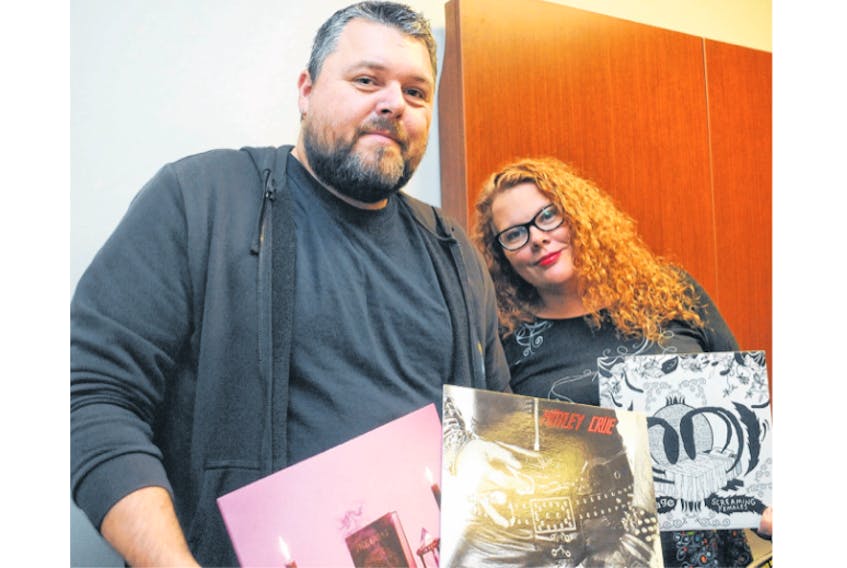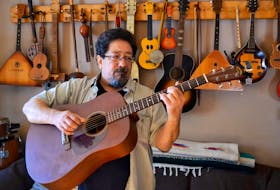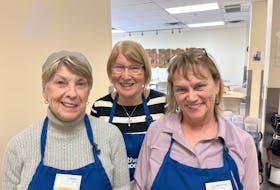ST. JOHN'S, N.L. — As a teen growing up in the 1970s, rock guitarist Thurston Moore of Sonic Youth fame recalled seeing pictures in magazines of new musicians from the early New York punk scene like Patti Smith and The Ramones. Their appearance struck him immediately, and it didn't matter that he hadn't heard a note of their music.
“When I started seeing pictures of Patti Smith and the Ramones during the mid-’70s, I was like, ‘What is this?’ It was like an extension of what I liked about David Bowie, Alice Cooper and T-Rex, and things that were more like outsider art in the rock world," Moore recalled in an interview published a few years ago on the website Louder.
Of course, in order to hear those artists at the time, he would need to track down a copy of an early single or album at a record shop, keep his ears close to college radio or try to sneak into a live show underage. If Moore was growing up today, he could simply do a quick internet search or use a streaming service on his phone to immediately hear songs by these artists.
A lot has changed when it comes to the way fans discover new music in the age of the internet. As bandwidth and download speeds have progressively increased over the last 20 years, the jump from file sharing of MP3s to the rise of streaming music on platforms like Spotify or Apple Music has made music more accessible than ever before.

Music fans
Doug Jones and Melisa Penney-Jones of Conception Bay South are fully aware of how much times have changed. Both are massive music fans who co-organize Record Fair NL, an event where obsessives go from table to table looking for that vinyl album they've always wanted but could never track down (the next one is Nov. 3 at the Holiday Inn). They also have two boys with their own musical interests.
"I would say video games and YouTube are their primary source of music, and they'll know stuff and not realize that it was a major hit in 1983 or whatever," laughed Penney-Jones, who in her own youth relied on mail-order music clubs like Columbia House and BMG Music Service. She would also tape songs from Top-40 radio and hear new music on cassette tapes shared among friends.
"They're presented with so much more media right in their hands. We never had any of that. We had the radio stations, and growing up around the bay, we never even had a rock station. It was two country stations."
The kids have Spotify accounts, but Jones said it's the parents who tend to make more use of it for discovering new sounds (he especially likes the playlists generated algorithmically based on their listening habits). When he was their age, it was a combination of music clubs, television, magazines and radio programs that shaped his musical taste. There was also an older uncle who had eclectic musical interests and could hip his nephew to cool sounds.
"I'd record 'City Limits' on MuchMusic. 'Brave New Waves' (on CBC FM) was a huge one for me It would come on from midnight to 5 a.m., so as I was about to go to sleep I'd hit record," Jones said. "I even sent (host) Brent Bambury a letter and everything. I was a total fanboy."
Online algorithms

Seventeen-year-old Matthew Kelly of St. John's has his ears tuned to music from all sorts of genres. Around the age of 11 or 12, he started using the internet to find out about contemporary alternative musical artists before loading their songs onto a portable music player. He considers Spotify something of a game changer.
"Spotify obviously came in, and that's a big difference, because that's algorithmic, and really more so than iTunes, it shoves things in your face. So I got into a lot of music because of that."
He also explored older sound through his father, particularly jazz, and did lots of reading about music online in addition to listening. He now enjoys a variety of genres. Kelly speculates younger people today are less beholden to listening to one style of music, in part because of the internet. Kelly also believes listeners today are less loyal to specific artists, and are more about the songs.
"It's exciting personally, but I can see the dynamics of how it's unethical, streaming and stuff," Kelly said. "It's not financially secure for most artists. But definitely, it's exciting. You can literally just go for free, click on a song, and it's playing, by whoever, no matter how obscure it is."
Siblings Reagan and Darcy Scott of Conception Bay South are also part of a younger generation that grew up with the internet as a primary resource for consuming music. Their family uses Apple Music, with each member of the household accessing a personal account.
"On my phone I find different artists on the trending page and things like that," explained 13-year-old Reagan, who particularly enjoys vocal jazz and pop.
Her older brother Darcy, 16, checks out a weekly playlist on Apple Music that updates on Fridays for new sounds.
"It's based around the stuff you've previously listened to, so if you listen to a lot of pop-folk music, it will kind of give you new artists and stuff like that in that specific genre," said Darcy, who also credits his dad, Jerry, for introducing him to older music.
Jerry Scott has even shared music with his son through Shazam, a mobile phone application that can identify a song's name and the artist performing it.
Like Jones and Penney-Jones, he used to get lots of music in his youth through Columbia House and by recording songs from the radio.
"You could get as many tapes as you could get for the lowest amount of money you could possibly spend," he recalled. "If it was something you really liked, you'd buy blank tapes and … probably just record a song from the radio to hear it at your convenience."
Physical media
Darcy has purchased CDs at live concerts to support the artists, but it's not a medium the Scott children make much use of. Darcy will occasionally listen to them in his dad's truck. He admits they're a bit inconvenient to use, with a quick search on Apple Music capable of tracking down whatever he's looking for.

"The new car that my mom has doesn't even have a CD player in it," Darcy noted. "So all the (music) has to be through radio or streaming or whatever you already have downloaded. I guess that form for digesting music is going away."
Kelly does like purchasing vinyl records, but admits he can't buy everything he'd like to, given how expensive they are. Over the last few years, vinyl record sales have grown to such an extent that major record labels, who ditched the medium in the early 1990s in favour of CDs, are now back in the game in a big way. That may in part explain why the price of records has risen dramatically in recent years. Vinyl albums now outsell CDs.
"If you like one song, you can listen to it on Spotify, but if you don't like their whole catalogue, why buy a record? So you have to buy records from your favourite artists is what I find," Kelly said.
Jones can remember times in his youth when it was hard to find albums by particular artists. He recalls friends from his skateboarding peer group who would go on family trips to Florida and find recordings they first came across in skate videos. These days, those problems don't exist so much.
"It's way easier now to find new music that is a style of what you like or things that you would listen to," said Penney-Jones.
Her husband finds the sheer volume of music available at your fingertips overwhelming at times, and that's in part why they both went back a few years ago from MP3s to purchasing vinyl albums.
"It's like the Netflix effect where instead of sitting down and listening to a set of songs, you're kind of flipping around and trying to find something. You spend more time looking than listening," he said.
Twitter: @CBNAndrew









